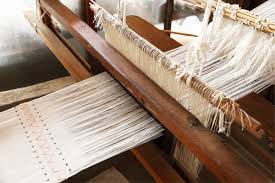Srinagar, Aug 07: On the 11th National Handloom Day, Director Handicrafts and Handloom Kashmir Mussarat-ul-Islam said the department is committed to supporting artisans and weavers across the valley.Addressing an event organised with cooperative societies, the Director said the day was celebrated to highlight the achievements of artisans and to promote locally made handloom products. A special clearance sale was also organised, featuring products made by trainees from departmental training centres. The items were created using raw material provided by the department and training received from master craftsmen.“I was very happy to see that a large number of craft lovers came to buy these products at nominal prices,” Mussarat-ul-Islam said. “This sale will continue till August 10, but I am hopeful that all items will be sold before that.”He highlighted that the theme of this year’s National Handloom Day, ‘Vocal for Local’ encourages people to support artisans by buying local, handmade products. He appealed to the general public to contribute to the revival of Kashmir’s traditional crafts by purchasing directly from weavers and craftsmen.The Director also spoke about women’s empowerment, saying the department is working to involve more women in the handloom and handicrafts sectors. “Women are being trained in centres and supported through cooperative societies so they can become economically independent,” he said.In the past six months, the Director said, the department has launched an awareness campaign to publicise various government schemes through social media and print platforms. Among the major schemes mentioned were the credit card scheme for easy finance, a non-refundable grant of Rs 1 lakh over two years for cooperative societies, and an educational allowance for the children of artisans.Mussarat said the department also offers marketing support through the Jammu and Kashmir Trade Promotion Organisation (JKTPO), which provides stalls at exhibitions at subsidised rates. “Trainees are supported with the supply of raw material, and schemes under the Ministry of Textiles provide modified looms free of cost under the National Handloom Development Programme,” he said.Established in 1972, the Department of Handicrafts and Handloom Kashmir currently operates 432 training centres. “Most of our present-day craftsmen and weavers are trained in these centres,” the Director said, adding that the department’s contribution to the craft sector is “massive and historic.”To promote innovation and quality control, the department works with institutions like the School of Design, Craft Development Institute (CDI), and Indian Institute of Craft and Technology (IICT). These bodies help with new designs, product testing, and skill development.The Director issued a stern warning against the sale of machine-made items falsely passing off as handmade products. He said that dedicated labs at IICT and CDI test items such as carpets and shawls for authenticity. Consumers are encouraged to file complaints if they suspect fraud. “We are available 24/7 for complaints, not just from tourists but from any buyer,” she said. “If someone doubts that a machine-made item was sold as handmade and it lacks QR code certification, they should come forward,” he said.Legal action can be taken under the J&K Registration of Tourist Trade Act, the Quality Control Act, and the GI Act, the Director warned. Penalties include fines, compensation, and blacklisting of businesses. The department has already taken action in several cases. He further advised buyers to always request a proper GST invoice when purchasing high-value items like Kani shawls, Pashmina products, Sozni embroidery, and carpets. The invoice should specify that the product is handmade and include artisan details. For larger items shipped, she recommended ensuring certification at IICT for GI tagging and QR coding. “A pure hand-woven Kani shawl can cost between Rs 60,000 and Rs 70,000. Buyers must demand certification to verify authenticity,” he urged.Mussarat also highlighted the department’s role across various sectors, including walnut wood carving, bridal wear, Sozni Pashmina, Namda, and other handicrafts. “We are active in every sector, supporting everything from design development to export,” he said. “We have also taken several steps to promote souvenirs and heritage products in newer markets.”
Committed to supporting artisans, weavers, says Director H&H Dept
Mussarat-ul-Islam highlights initiatives to promote local crafts, empower women, combat counterfeit products

Aatif Qayoom is a Senior Correspondent at Rising Kashmir, covering crime, tourism, sports, and various social issues across Jammu and Kashmir. Known for his accurate and ground-based reporting, he highlights stories that matter to people.
Leave a Comment Leave a Comment







